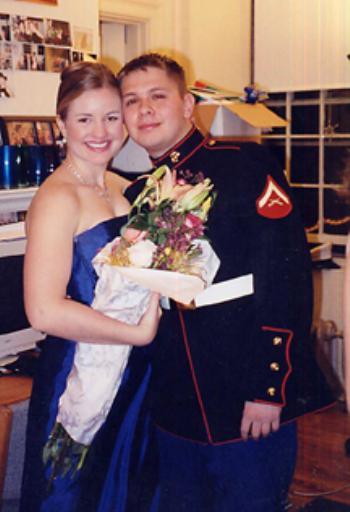
News
Cambridge Residents Slam Council Proposal to Delay Bike Lane Construction

News
‘Gender-Affirming Slay Fest’: Harvard College QSA Hosts Annual Queer Prom

News
‘Not Being Nerds’: Harvard Students Dance to Tinashe at Yardfest

News
Wrongful Death Trial Against CAMHS Employee Over 2015 Student Suicide To Begin Tuesday

News
Cornel West, Harvard Affiliates Call for University to Divest from ‘Israeli Apartheid’ at Rally
War Profiles: Ruben Marinelarena '02-'04, Lance Corporal, U.S. Marine Corps Reserve

Just like tens of thousands college seniors across the country, Ruben Marinelarena ’02-’04 will scramble to prepare for the LSATs and apply to law school this fall.
But Marinelarena will face a unique challenge.
He will take his LSAT in Okinawa, Japan, where he will be undergoing jungle warfare training as a lance corporal in the U.S. Marine Corps Reserve.
Marinelarena, a reservist who was activated in January because of the war in Iraq, spent the spring semester at Camp LeJeune in North Carolina, learning the ins and outs of urban combat and crowd control.
He said he is unlikely to see combat, and if all goes well he will be home for next year’s spring semester and will graduate with the Class of 2004.
But there is much that he will miss before his homecoming.
His older sister Laura is getting married this July, and his younger sister Alex is graduating from junior high school in June, but he will be unable to attend either event.
And as his classmates march through their House courtyards bedecked in graduation caps and gowns next week, Marinelarena will not be among them.
In fact, Marinelarena only recently finished the first semester of his senior year when he took his last final exam from the fall semester at Camp LeJeune.
He said it is sometimes difficult to justify—both to himself and to those who are close to him—why he needs to miss these events if he isn’t going to see action.
“Sometimes it’s hard to see the bigger picture of why we’re activated if we’re not going to war,” said Marinelarena. “I imagined that if I would be pulled from my school and pulled from my life, that it would be for combat.”
“Families aren’t just like marines. They can’t just take orders as well as we do,” he added.
And Marinelarena has trained long and hard to learn how to follow orders.
His training involved three-day maneuvers and enduring military-strength pepper spray, said his girlfriend of a year and half, Kate S. Widland ’04, who said she traveled to North Carolina twice over the past few months.
“It’s amazingly different from Harvard,” said Widland, who said she hopes to visit him in Okinawa this summer.
In addition to the stress of training, Marinelarena said, it was hard to deal with some of the personalities he came across. But he found ways to cope with the “one-track minds” with which he found himself coming into contact.
“I look into the future, I think about what I’ll be doing in six months, three years, five years,” Marinelarena said. “Whenever I get a chance, I open a book that’s non-military-related. There’s lots of people I’m with that are going through the same problems. We joke about it, we poke fun at it.”
Back at Harvard, Marinelarena was a government concentrator with a focus on international relations who belonged to the Sigma Chi fraternity.
Widland is also Sigma Chi’s “sweetheart”—an honorary position in the fraternity that she was elected to this semester.
Upon her selection, Marinelarena called her from camp to serenade her with “The Sweetheart of Sigma Chi,” a traditional fraternity song written in 1911.
Widland described Marinelarena as “a very fun and easy-going person,” as well as “really committed to making the world a better place, even if it involves personal sacrifice.”
“I never expected to go off to Harvard and have a boyfriend in the Marine Corps who would go off to help with Operation Enduring Freedom,” Widland said. But, she added, it has been an educational experience.
It has certainly been one for Marinelarena as well.
He has been trained in the tactics of warfare. He has seen fellow reservists activated and separated from their families, businesses and the rest of their lives. He has learned, he said , to accept difficult situations that he lacks the power to change.
He also says he has learned about the nature of sacrifice.
“It puts things in perspective to know that there are men and women making greater sacrifices than I am,” he says. “I am still very proud to serve my country and help out in any way I can. It’s the least I can do.”
—Staff writer Laura L. Krug can be reached at krug@fas.harvard.edu.
Want to keep up with breaking news? Subscribe to our email newsletter.
